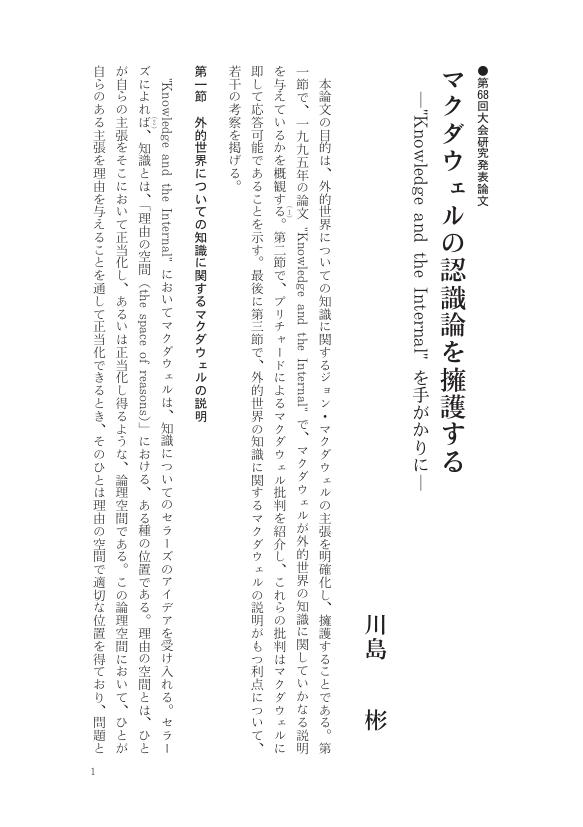7 0 0 0 OA プロクロス『プラトン『国家』注解』第四論文 日本語訳・注
- 著者
- 近藤 智彦 川島 彬 高橋 勇真 野村 拓矢
- 出版者
- 北海道大学
- 雑誌
- 北海道大学文学研究院紀要 (ISSN:24349771)
- 巻号頁・発行日
- vol.169, pp.41-70, 2023-03-27
2 0 0 0 OA プラトン『国家』第六・七巻における「〈善〉のイデア」と「仮設されたのでない原理」
- 著者
- 川島 彬
- 出版者
- 日本哲学会
- 雑誌
- 哲学 (ISSN:03873358)
- 巻号頁・発行日
- vol.2019, no.70, pp.191-204, 2019-04-01 (Released:2019-04-18)
- 参考文献数
- 19
In this paper, I provide an interpretation of ‘the Form of the Good’ and ‘the unhypothesized principle’ in Plato’s Republic, VI-VII. Regarding the ‘Form of the Good,’ I first consider what is meant by the fact that Plato speaks of ‘the Good,’ on the one hand, usually as one Form among others and, on the other hand, at Republic, 509b7-9 as a special ‘Form’ that transcends the other Forms. I argue that these two ways of speaking of the Good should not represent two different items (pace Fujisawa) but rather two aspects of the same item. The Form of the Good is the cause of good things being good, just as the Form X is the cause of x things being x. And, for Plato, for something to be good is for its components to be unified. Now, the totality of Forms is something good, and this is made good by the Good, which unifies the system of Forms (this unification is what the Good does as the special, transcending ‘Form’). ‘The unhypothesized principle’, which the dialectician grasps at the end of ‘the upward path’, is, in my view, the system of Forms (and not, as many suppose, the Good itself). In the upward path, the dialectician subsumes a given Form under a more general Form and then subsumes this under an even more general Form, so that the whole system of Forms is both the endpoint of this procedure and the starting point (archē) for the downward path. This system is an especially good thing, showing, I suggest, the highest unity; grasping this system helps one to understand how unification in general comes about, which understanding, in turn, promotes the understanding of the Good.
1 0 0 0 OA 見物好きの者は説得されたか プラトン『国家』第五巻476d7 ─480a13 解釈
- 著者
- 川島 彬
- 出版者
- 日本倫理学会
- 雑誌
- 倫理学年報 (ISSN:24344699)
- 巻号頁・発行日
- vol.67, pp.91-104, 2018 (Released:2019-04-01)
At 475d1─476d6 in Plato’s Republic, Socrates and Glaucon speak about “sightlovers”(philotheamones), people who are eager to see any theatrical performancebut not interested in Forms. Socrates says that sight-lovers do not possess “knowledge”(epistēmē)but only “belief” (doxa). Glaucon imagines that they would be offended to hear this and would object. So Socrates presents an argument to persuade the sight-lovers that his description of them is correct (476e4─480a13). Interpreters have seldom addressed the question of whether the sight-lovers would have been persuaded by Socrates’ argument. The aim of this paper is to show that they would have been persuaded. The challenge is to show how the sight-lovers, who do not subscribe to the theory of Forms, could accept the argument that rests on that theory(on any interpretation). For this purpose, I first present an interpretation of the argument, according to which, “what(perfectly)is” means what is perfectly f(say, beautiful)and refers, for Socrates, to Forms collectively. For Socrates, knowledge concerned with f is acquaintance with Form F, and at the same time, the sufficient understanding of what f is; while belief is acquaintance with f sensibles and an insufficient understanding of what f -ness is. The key to understanding how the sight-lovers would have been persuaded is to notice that initially they would probably take “what is perfectly beautiful” as referring to exemplarily beautiful sensibles, such as theatrical performances. Without accepting the theory of Forms, they could accept the premise stated at 477a3─4 about the correlation between the degrees of F-ness and the degrees of intelligibility. It is at 479a5-b7 that Socrates makes the sight-lovers accept that no sensible can qualify as “what perfectly is.” They might accept this, since they know from experience, say, that the same theatrical piece once found most beautiful may turn out to be awful depending on the circumstances of performance. By the end of the argument, the sight-lovers are such as neither determinately to reject nor clearly to recognize the existence of Forms. To conclude, I address the following question: If Socrates could have persuaded the sight-lovers that they lack knowledge, as I have argued, then, what does this fact mean for the broader context in the Republic, in particular Socrates’conception of the ideal city?
- 著者
- 川島 彬
- 出版者
- 東北哲学会
- 雑誌
- 東北哲学会年報 (ISSN:09139354)
- 巻号頁・発行日
- vol.35, pp.1-13, 2019 (Released:2022-07-29)
